Guatemala – Education In Action 2009
 Tuesday, March 31, 2009 at 10:58AM
Tuesday, March 31, 2009 at 10:58AM 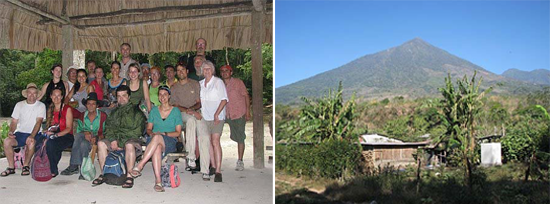 Canadian volunteers in Guatemala
Canadian volunteers in Guatemala
Three years after the inauguration of the Education In Action (EIA) house building project, 21 Canadian volunteers set out to build 13 houses for some of Guatemala’s poorest families in March 2009.
The EIA housing project is a collective effort between the Comité Campesino del Altiplano (CCDA) and Education In Action in Canada. The CCDA is a grassroots coalition working to protect the rights of workers and to help the Mayan people reclaim land rights. Together, EIA and the CCDA manage the house building project combined with emphasis on cultural exchange.
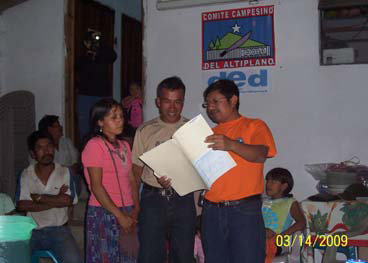 Leocadio Juracan, President of CCDA awards a family with their land right registration – registered in the family’s name.
Leocadio Juracan, President of CCDA awards a family with their land right registration – registered in the family’s name.
Villages vote to have land rights registered in their family name rather than registered in the husband’s name.
The CCDA makes recommendations and determines who will be the recipient families for the new houses through a selection practice that was established prior to the commencement of the Education In Action project. The criteria requests that each family bring needed resources to the community – must be involved during the construction – can not contest for a better house than that of which is being built – must work collectively with the CCDA and the community at hand – commit to do well for the family.
Since 2007, 42 families have received homes contributed by volunteers of Education In Action
Supported in part by the Public Service Alliance of Canada (PSAC) Social Justice Fund, members from across Canada have benefited from working hand in hand with Mayan communities and welcome this cultural exchange.
All EIA members and volunteers participate in fundraising activities throughout the year to raise enough funds to purchase the necessary building materials required to build these new homes. Each home cost $2,000 CAN
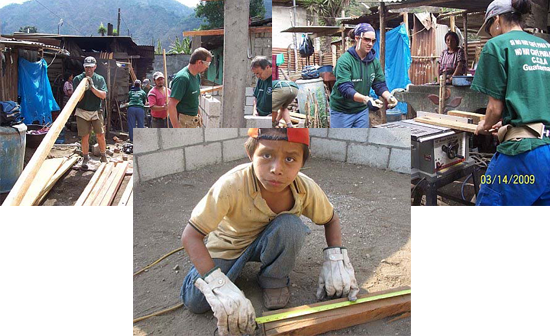
Living with the community in Quixayá, San Lucas Tolimán, participants experience the gentleness of the people and the solidarity when working together while living in extreme poverty. This empowering consciousness led the volunteers as they selflessly worked with the Mayan people to help rebuild their communities shattered over the years by Hurricanes, Civil War and continued forced displacements.
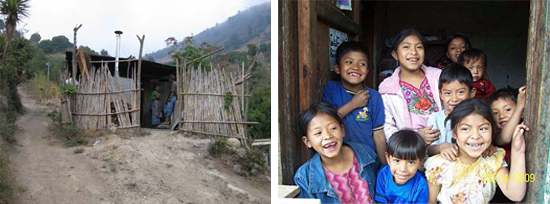
Villages with families populated with children build their homes with materials they can gather such as bamboo, plastic, rope and tin.
2009 – Recipient Communities / New Homes
- Providencia – 5 families
- Ojo de Agua – 3 families
- San Lucas Tolimán – 2 families
- Cerro de oro – 3 families
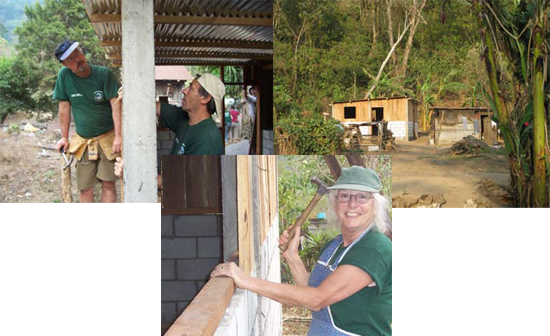
The new homes are built with a cement block foundation, planks of rough wood for walls, doors and windows and corrugated tin to complete the roof.
Fair Trade Coffee “Café Justicia”
Grown in the highlands of Lake Atitlan, the CCDA operates a successful coffee plantation offering training and fair wages to its workers.
On average a family will work all day to fill 5 sacs of coffee weighing 40 lbs each. A worker will receive $6.47 per day plus .65¢ per hour for overtime worked compared to private coffee plantations known as “fincas” where the average worker will receive $2.27 per day with no overtime pay and half that wage if the worker is a woman – children never get paid.
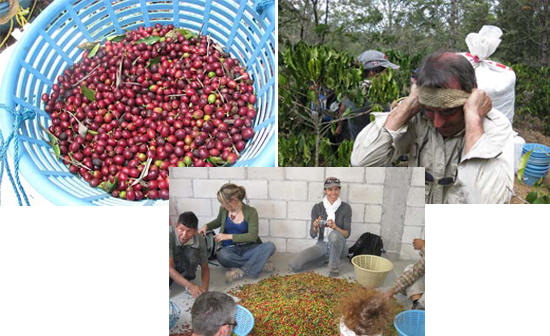
Preparing the coffee beans for export...
The Canadian volunteers spent a day working with the coffee farmers sorting coffee beans.
Processing coffee is no easy matter. The coffee picked will travel through 5 levels of processing before it is ready for the market. The beans are manually selected between red and the green bean, then lowered into a holding tank filled with water where they are cleaned and funneled through a quality and sizing process. The shell is removed from the bean and carried to nearby composting beds. Once the shells have completely decomposed, the organic matter is distributed, free of charge, to other farmers learning to grow organically. Nothing is wasted.
Back at the plant, the de-shelled coffee beans are sorted by color and packaged in 40 pound bags ready for export.
“Café Justicia provides benefits to the workers and to the consumer.”
Café Justicia is not only sold for profit but is used to educate the consumer to the benefits of buying coffee that is fairly traded and organically grown. Café Justicia is another way that EIA raises funds to help purchase the necessary building materials for the new homes.
Café Justicia is sold in six cities across Canada. For more information on Café Justicia and where you can purchase it, please contact the PSAC Social Justice Fund at SJF-FJS@psac-afpc.com
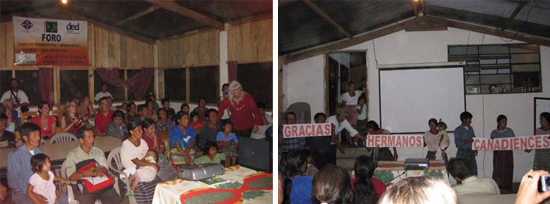
On the last evening, the recipient families host an evening celebrating and thanking the Canadian volunteers for their compassion and for their new homes.
Another year working together – making our communities and our commitments stronger!
Thank you,
PSAC Social Justice Fund, World Accord and all the volunteers and groups, for supporting this worker education initiative.